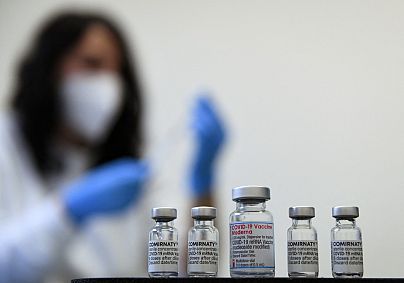COVID vaccine manufacturers are racing to develop new doses to combat the rising number of cases connected to the Omicron variant.
As the world grapples to know more about the new COVID-19 variant formerly known as B.1.1.529 and now dubbed Omicron by the World Health Organization (WHO), vaccine manufacturers are issuing guidance on how effective their doses could be against it.
 ADVERTISEMENT
ADVERTISEMENT
 ADVERTISEMENT
ADVERTISEMENT
They are also racing to develop new vaccines to combat the new variant.
How effective are they now and how long will an updated vaccine take? Here is a breakdown of what vaccine manufacturers have said so far.
Moderna
Moderna could have a COVID-19 booster shot targeting the Omicron variant tested and ready to file for US authorisation as soon as March, the company's president said on December 1.
Moderna President Stephen Hoge said he believes booster shots carrying genes specifically targeting mutations in the newly-discovered Omicron variant would be the quickest way to address any anticipated reductions in vaccine efficacy it may cause.
Moderna’s CEO had warned earlier in December its COVID-19 Spikevax vaccine is likely to be much less effective against the Omicron variant than previous variants.
Speaking to the Financial Times, Stéphane Bancel said the large number of mutations in the variant suggested that the current COVID-19 vaccines may need to be adjusted to retain their effectiveness against the virus should Omicron become dominant.
"There is no world, I think, where [the effectiveness] is the same level...we had with Delta," Bancel told the FT on Tuesday.
"I think it’s going to be a material drop. I just don’t know how much because we need to wait for the data. But all the scientists I’ve talked to...are like 'this is not going to be good".
Meanwhile, on Monday, Bancel told CNBC that it could be “months” before Moderna develops and ships a vaccine that specifically targets the Omicron variant.
He said it will take at least two weeks to determine how much the Omicron mutations have impacted the vaccine’s efficacy.
Both Moderna and Pfizer-BioNTech plan to test whether booster shots will bolster the immune system enough to fend off the new variant. Boosters of both vaccines have been shown to raise antibody levels significantly.
Pfizer-BioNTech
BioNTech and Pfizer said on 8 December a three-shot course of their COVID-19 vaccine was able to neutralise the new Omicron variant and said they could deliver an upgraded vaccine in March 2022 if needed.
The German and US companies said two doses of their vaccine resulted in significantly lower neutralising antibodies but a third dose boosted those antibodies by a factor of 25.
The Omicron variant was neutralised in samples of blood taken around a month after the third shot about as effectively as two doses neutralised the original virus identified in China.
"Ensuring as many people as possible are fully vaccinated with the first two dose series and a booster remains the best course of action to prevent the spread of COVID-19," Pfizer boss Albert Bourla said in the statement.
BioNTech’s CEO Ugur Sahin told Reuters earlier in December that its COVID-19 vaccine will likely offer strong protection against Omicron.
"The only thing that worries me at the moment is the fact that there are people that have not been vaccinated at all," he said.
The mRNA vaccines (Moderna’s and Pfizer-BioNTech’s ) have a technology that should permit rapid modification.
Pfizer’s scientists "can adapt the current vaccine within six weeks and ship initial batches within 100 days in the event of an escape variant," said Jerica Pitts, a spokeswoman for Pfizer.
Oxford-AstraZeneca
The University of Oxford, which developed the Vaxzevria COVID-19 vaccine with AstraZeneca, said there was no evidence that vaccines would not prevent severe disease from Omicron.
But it said it was ready to rapidly develop an updated version of its vaccine if necessary.
"Despite the appearance of new variants over the past year, vaccines have continued to provide very high levels of protection against severe disease and there is no evidence so far that Omicron is any different," the University said in a statement on Tuesday.
Johnson & Johnson
Johnson & Johnson, owners of the one-shot Janssen vaccine, has already begun work on an Omicron vaccine, the company announced in a statement on Monday.
It said it has been "closely monitoring newly emerging COVID-19 variants" and has been "evaluating the effectiveness of its COVID-19 vaccine across variants" including Omicron.
The company also said it is testing blood serum from people who are taking part in booster studies to look at how their vaccine can be improved to deal with Omicron.
What we know so far
The main unknown surrounding this variant is its multiple mutations. Some are worrisome, according to the WHO. This is mainly because of the risk of reinfection.
South African scientists have said it contains more than 30 mutations to the spike protein, which is the component of the virus that binds to cells. This is significantly more mutations than the Delta variant.
Scientists are concerned as the spike protein mutations could make this new variant more transmissible and it’s also possible the new variant may reduce the effectiveness of the available diagnostics, drugs, and vaccines.
The WHO says It is not yet clear whether infection with Omicron, discovered in November, causes more severe disease compared to infections with other variants, including Delta.











